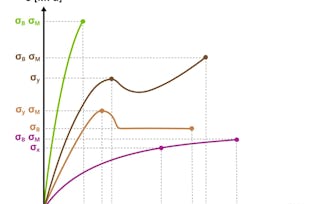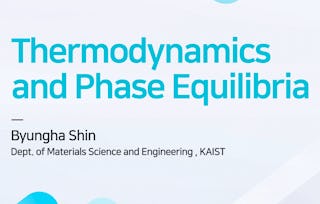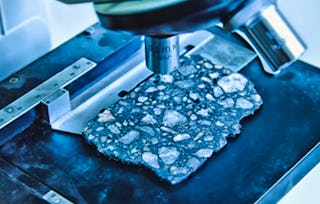In this course, we will look at phase diagrams and how they are used to determine the state of the material as a function of temperature and composition. We will also investigate how the microstructure and materials properties can be manipulated as a function of temperature and composition. A special focus will be on the eutectic phase diagram.

Gain next-level skills with Coursera Plus for $199 (regularly $399). Save now.

Phase Diagrams I & II
This course is part of Materials Science for Technological Application Specialization

Instructor: Terry Alford
1,882 already enrolled
Included with
(28 reviews)
Recommended experience
What you'll learn
The use of principles of phase diagrams to predict microstructures and properties of metals and alloys.
Skills you'll gain
Details to know

Add to your LinkedIn profile
See how employees at top companies are mastering in-demand skills

Build your subject-matter expertise
- Learn new concepts from industry experts
- Gain a foundational understanding of a subject or tool
- Develop job-relevant skills with hands-on projects
- Earn a shareable career certificate

There are 5 modules in this course
In this course, we will look at phase diagrams and how they are used to determine the state of the material as a function of temperature and composition. We will also investigate how the microstructure and materials properties can be manipulated as a function of temperature and composition. A special focus will be on the eutectic phase diagram.
What's included
1 video1 reading
In this module, we explain the concepts of solubility, solubility limit, saturation and solubility limit lines (solvus) on phase diagrams.
What's included
3 videos6 readings1 assignment1 discussion prompt
The eutectic phase diagram is important for solder ball and inter-metal interconnects in semiconductor industry. In this module we discuss eutectic phase diagrams.
What's included
2 videos4 readings1 discussion prompt
In this module, we examine eutectic microstructure and eutectic properties.
What's included
2 videos4 readings1 discussion prompt
In this module, you will explore hypoeutectic and hypereutectic alloys and their composition and cooling impacts microstructures.
What's included
4 videos6 readings1 assignment1 peer review2 discussion prompts
Earn a career certificate
Add this credential to your LinkedIn profile, resume, or CV. Share it on social media and in your performance review.
Instructor

Offered by
Explore more from Mechanical Engineering
 Status: Free Trial
Status: Free TrialArizona State University
 Status: Preview
Status: PreviewKorea Advanced Institute of Science and Technology(KAIST)
 Status: Preview
Status: PreviewGeorgia Institute of Technology
 Status: Free Trial
Status: Free TrialArizona State University
Why people choose Coursera for their career




Learner reviews
28 reviews
- 5 stars
72.41%
- 4 stars
17.24%
- 3 stars
6.89%
- 2 stars
3.44%
- 1 star
0%
Showing 3 of 28
Reviewed on Aug 8, 2025
This course helps me to understand pros and cons about material science even it's short term course. Professor tried to cover up each and every important properties of the material.

Open new doors with Coursera Plus
Unlimited access to 10,000+ world-class courses, hands-on projects, and job-ready certificate programs - all included in your subscription
Advance your career with an online degree
Earn a degree from world-class universities - 100% online
Join over 3,400 global companies that choose Coursera for Business
Upskill your employees to excel in the digital economy
Frequently asked questions
To access the course materials, assignments and to earn a Certificate, you will need to purchase the Certificate experience when you enroll in a course. You can try a Free Trial instead, or apply for Financial Aid. The course may offer 'Full Course, No Certificate' instead. This option lets you see all course materials, submit required assessments, and get a final grade. This also means that you will not be able to purchase a Certificate experience.
When you enroll in the course, you get access to all of the courses in the Specialization, and you earn a certificate when you complete the work. Your electronic Certificate will be added to your Accomplishments page - from there, you can print your Certificate or add it to your LinkedIn profile.
Yes. In select learning programs, you can apply for financial aid or a scholarship if you can’t afford the enrollment fee. If fin aid or scholarship is available for your learning program selection, you’ll find a link to apply on the description page.
More questions
Financial aid available,
¹ Some assignments in this course are AI-graded. For these assignments, your data will be used in accordance with Coursera's Privacy Notice.

